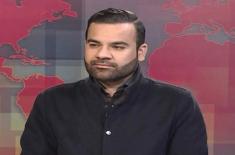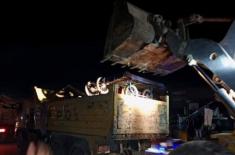
WHO Urges Protection Of Healthcare In Conflict Zones
Fahad Shabbir (@FahadShabbir) Published August 19, 2025 | 04:30 PM

GENEVA, (UrduPoint / Pakistan Point News / WAM - 19th Aug, 2025) The World Health Organisation (WHO) has called on all parties involved in conflicts to effectively protect and respect healthcare, ensuring the safe and continuous provision of medical services and guaranteeing access without violence, threats or fear.
The organisation confirmed that it has verified 821 attacks on the health sector worldwide since the beginning of this year, resulting in 1,121 deaths and 645 injuries among healthcare workers and patients across 16 countries and territories.
Christian Lindmeier, WHO spokesperson, said in a press briefing in Geneva to mark World Humanitarian Day that attacks targeting healthcare facilities, staff, and infrastructure have increased amid escalating, complex and protracted global conflicts, describing such acts as clear violations of international law.
He noted that the five countries reporting the highest number of attacks so far this year are Ukraine with 325, the occupied Palestinian territories with 304, the Democratic Republic of the Congo with 38, Sudan with 38, and Myanmar with 33.
WHO also reported 1,647 attacks on healthcare in 16 countries and territories during 2024, which caused 944 deaths and 1,779 injuries. The organisation defines attacks on health as any acts of verbal or physical violence, obstruction, or threats of violence that hinder the availability, accessibility, and delivery of curative and/or preventive health services during emergencies.
The spokesperson stressed that such attacks not only kill and injure but also deprive people of urgent care, place healthcare providers at risk, undermine health systems, and disrupt access to services at times when they are most needed.
WHO further underlined that humanitarian needs are increasing amid a sharp decline in funding, making sustainable and diversified support from member states and other stakeholders more crucial than ever.
Recent Stories

Federal Minister for Information Technology and Telecommunication Shaza Fatima K ..

PFA Attock cracks down on substandard food units in Attock

Constitutional amendment, political consensus vital for establishing new provinc ..

RDA Squad conducts inspection at Chahan, Tarbela & Mujahid dams to curb water p ..

CDA clears encroachments in major drive on GT Road, T-Chowk

DIG Sukkur distributes appreciation letters to SSPs for maintaining Law & Order

KP minister, humanitarian bodies discuss relief, rehabilitation

China-Pakistan cooperation scores 12 deals worth 235 million yuan in Kashgar

Punjab Assembly Speaker, IT Minister to discuss digital vision

Aid into Gaza insufficient to avert ‘widespread starvation’ as Israeli restr ..

Murree Admin keeps Expressway, other roads open amid rain, landslide

CDA reviews Monsoon emergency preparations, announces training with Chinese expe ..
More Stories From Middle East
-

SEC approves Sharjah Museums Authority’s new organisational structure
9 hours ago -

Saud bin Saqr receives Slovak Ambassador
9 hours ago -
WHO urges protection of healthcare in conflict zones
9 hours ago -

UAE’s Alia Abdulsalam sets personal best in Formula 4 in Norway
9 hours ago -

Zayed Charity Run in Beijing reflects depth of bilateral ties: UAE Ambassador to China
9 hours ago -

UAE Ambassador meets with President of Palau
9 hours ago
-

FTA calls Corporate Tax taxpayers to complete Tax Records, submit Tax Returns, pay Corporate Tax du ..
9 hours ago -

Compelling documentary showcases Dubai Humanitarian’s work as world’s largest humanitarian logis ..
9 hours ago -

UN calls for end to attacks on humanitarian space
10 hours ago -

Ras Al Khaimah leads regional real estate boom as one of fastest-growing markets
10 hours ago -

UAE AI Camp concludes seventh edition with over 70 diverse workshops
10 hours ago -
EU-US trade deal stalls over digital platforms regulation
10 hours ago









